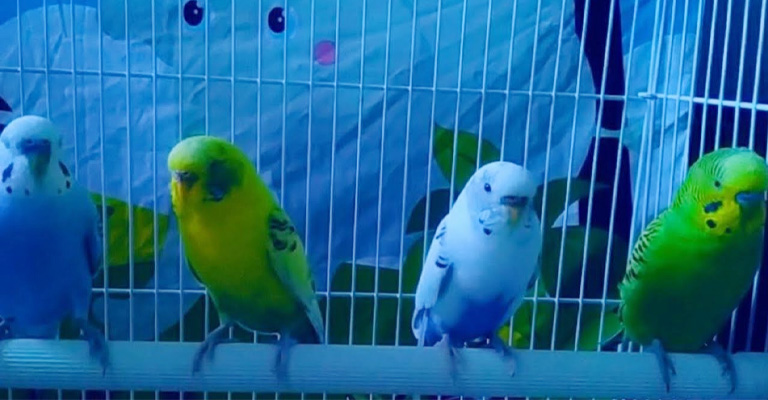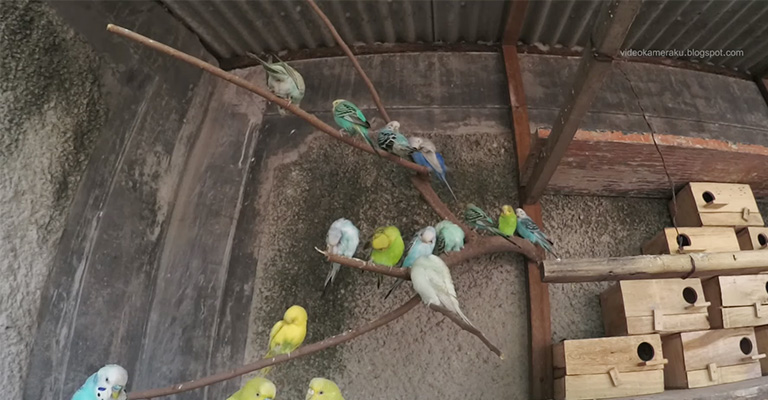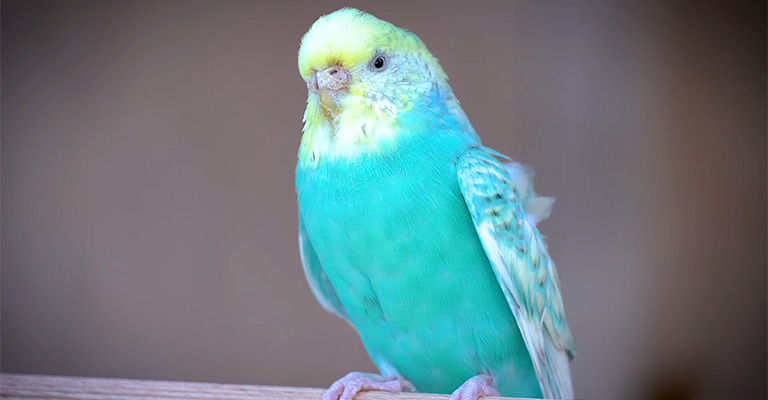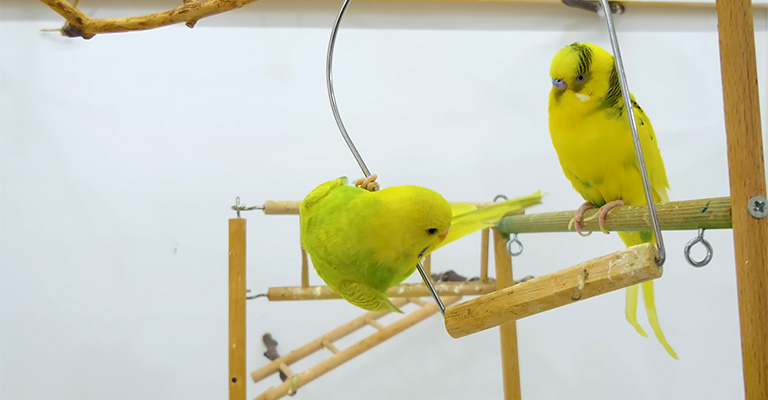Parakeets are lovely and cheerful birds that can brighten up any home with their colorful feathers and lively chirps. However, sometimes these birds can experience a frightening phenomenon called night fright.
Night fright is a sudden panic attack in the dark or at night, causing the parakeet to flap its wings wildly, crash into the cage bars, and scream. This can result in injuries, stress, and even death for the parakeet.
In this article, we will explain what causes night fright in parakeets, how to prevent it, and what to do if it happens.

What Is Night Fright In Parakeets?
Night fright is any disturbance that causes a bird to suddenly become spooked or unnerved in the dark or on a quiet night. Birds may fluff their feathers, widen their eyes, fall off their perch, thrash around the floor cage, and hit their toys and perches. Night fright can last from a few seconds to several minutes, depending on the severity of the trigger and the bird’s temperament.
Night fright is especially common in parakeets, as they are prey animals with poor night vision. Parakeets are used to living in large flocks in the wild, where they can rely on each other for safety and comfort. They may feel more vulnerable and isolated in captivity, especially if kept alone or in a new environment.
What Causes Night Fright In Parakeets?

There are many possible triggers for night fright in parakeets, such as:
Loud Noises
Thunderstorms, fireworks, car alarms, sirens, doorbells, TV sounds, people shouting, or other sudden or loud noises can startle a sleeping parakeet and make it think there is danger nearby.
Flashes of Light
Lightning, car headlights, camera flashes, TV screens, or other bright light sources can temporarily blind a parakeet and make it lose its sense of direction and balance.
Shadows or Movements
Curtains blowing in the wind, trees swaying outside the window, ceiling fans, predatory animals near the cage, or even your silhouette can cast scary shadows or movements that can spook a parakeet.
Loneliness

Parakeets are social birds that need companionship and interaction. They may feel anxious and insecure if kept alone or separated from their flock mates at night.
Change of Environment
Moving to a new home or cage, rearranging the furniture or cage accessories, introducing new toys or perches, or changing the location of the cell can stress out a parakeet and make it more sensitive to unfamiliar stimuli.
Interrupted Sleep Pattern
Parakeets need about 12 hours of uninterrupted sleep every night to stay healthy and happy. Suppose noise, light, temperature changes, or other factors disrupt their sleep cycle. In that case, they may become more restless and prone to night frights.
Trauma
Parakeets that have experienced the loss of a mate or flock member, abuse, neglect, illness, injury, or other traumatic events may suffer from depression, anxiety, nightmares, or post-traumatic stress disorder (PTSD), which can trigger night frights.
How to Prevent Night Fright In Parakeets?

The best way to prevent night fright in parakeets is to provide them with a safe and comfortable environment that mimics their natural habitat as much as possible. Here are some tips on how to do that:
Provide a Night Light
One of the most effective ways to alleviate night fright in parakeets is by providing a night light in their cage or in the room where they sleep. Soft, low-intensity light can help alleviate the parakeet’s fear of the dark and create a sense of security. Avoid using bright or flashing lights, as they can have the opposite effect and further distress the bird.
Cover the Cage
Covering the parakeet’s cage with a light, breathable cloth can create a cozy and secure sleeping environment for your feathered friend. The cover should be large enough to block out any external sources of light but should also allow for proper ventilation. This covering will provide a sense of security and help reduce the likelihood of night fright.
Keep the Cage Away from Windows
Position the parakeet’s cage in an area of the room that is away from windows or any potential sources of external disturbances. This will minimize sudden movements, noises, and shadows that may startle the bird during the night. A quiet and undisturbed sleeping environment is crucial for preventing night fright.
Provide a Companion

Parakeets are highly social birds and often feel more secure when they have a companion. If possible, consider getting a second parakeet as a cage mate for your existing bird.
The presence of a companion can help reduce anxiety and provide a sense of safety, particularly during the night. Introduce the new bird gradually and ensure they get along well before housing them together.
Check for any Injuries after a Night Fright
Despite our best efforts, parakeets may occasionally experience night fright. It’s important to check for any injuries or signs of distress following such incidents.
Inspect the bird for any physical injuries, such as broken feathers or bleeding. If you notice any injuries or abnormal behavior, seek veterinary assistance immediately.
Speak Soothingly to Your Parakeet
During a night fright or any stressful situation, comforting your parakeet with a soothing voice can help alleviate their fear. Speak softly and reassuringly to your bird, letting them know they are safe.
Avoid sudden movements or loud noises that could further startle them. Consistent, gentle reassurance will go a long way in building trust and confidence with your parakeet.
Establish a Consistent Routine
Parakeets thrive on routine, and establishing a consistent daily schedule can help minimize stress and anxiety. Ensure your bird has regular sleep and wake-up times, and maintain a consistent feeding and playtime routine. By providing a structured environment, you can help your parakeet feel secure and reduce the likelihood of night fright.
What Birds Are Susceptible To Night Frights Like Parakeets?
Night frights, also known as night frights or nocturnal panic attacks, can affect various bird species. Here are some points explaining which birds are commonly susceptible to night frights-
Cockatoos
Cockatoos are notorious for experiencing night frights. Their sensitive nature and tendency to become easily alarmed can make them more susceptible to nocturnal panic attacks.
Canaries and Finches
Smaller birds like canaries and finches are also known to be susceptible to night frights. Their small size and delicate nature make them more prone to stress and panic, especially in unfamiliar or disruptive environments.
Budgerigars (budgies)
Budgies are popular pet birds and can also be susceptible to night frights. Their small size and highly active nature make them vulnerable to sudden disturbances or changes in their surroundings.
Lovebirds
Lovebirds, known for their social behavior and strong bond with their owners, can experience night frights. Their heightened sensitivity and inclination towards vigilance can make them more prone to sudden panic attacks during the night.
Other Species
While the bird, as mentioned earlier, species are commonly susceptible to night frights, it is essential to note that any bird can experience this condition. Each bird’s unique personality, stress triggers, and environmental sensitivities may contribute to night frights.
FAQs
You may hear your parakeet scream, flap its wings, or hit the cage bars at night. You may also notice signs of stress or injury on your parakeet, such as feather loss, bleeding, bruising, or broken nails.
First, turn on a light and approach your parakeet’s cage slowly and gently. Please speak to your parakeet in a soft and soothing voice and reassure it that everything is okay. Check your parakeet for any injuries and treat them accordingly. You may also offer your parakeet some water or a treat to help it relax.
The frequency of night frights in parakeets varies depending on the individual bird and its environment. Some parakeets may never have night frights, while others may occasionally or regularly. Night frights are more likely to occur during stormy weather, holidays, or other times with more noise and light disturbances.
Night frights can be fatal for parakeets if they cause severe injuries, such as broken bones, internal bleeding, or head trauma. Night frights can also cause chronic stress, weakening the immune system and making the parakeet more susceptible to diseases and infections.
You can prevent night frights in parakeets by providing them with a safe and comfortable environment that mimics their natural habitat as much as possible. You can do this by covering the cage at night, providing a night light, eliminating potential threats, providing companionship, maintaining a regular sleep schedule, and reducing stress.
Conclusion
Night fright is a prevalent issue that can significantly impact the well-being of parakeets, both physically and emotionally. It is essential for parakeet owners to be vigilant and proactive in monitoring their birds’ behavior and overall health.
By recognizing the causes of night fright and taking preventative measures, such as providing a safe and comfortable sleeping environment, owners can help their parakeets sleep better and lead happier lives.
Additionally, seeking professional guidance from a veterinarian is crucial in addressing any concerns or implementing appropriate treatment plans. By prioritizing the welfare of our feathered friends, we can ensure their optimal health and happiness as beloved companions.